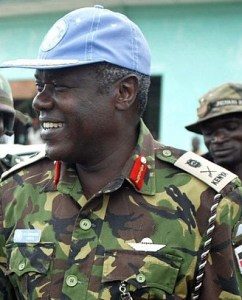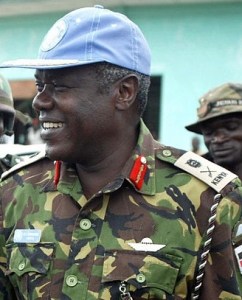
From 2003 to 2005, retired Lieutenant General Daniel Opande was the force commander of the peacekeepers of the UN Mission in Liberia (UNMIL). Tough but diplomatic, the Kenya Defence Forces officer in 2004 got the commanders of Liberia’s warring factions to agree to the disarming of more than 100,000 former combatants. UNMIL also provided security, technical and logistical support for the electoral process that culminated in peaceful democratic elections in 2005. As the mission finally winds down operations in March 2018, Africa Renewal’sZipporah Musau and Kingsley Ighobor interviewed Lieutenant General Opande on his experience leading a multinational force during a most challenging period in Liberia. These are excerpts.
Africa Renewal: Can you briefly describe the security situation in Liberia when you first got there?
Lieutenant General (Rtd) Daniel Opande:I arrived in Liberia from Sierra Leone on 1st October 2003. By then Sierra Leone had established a UN peacekeeping mission. The situation in Sierra Leone had returned to normal: there was a functioning government and peace had been restored throughout the country. But Liberia was the opposite: nothing functioned, the government had collapsed, there was no effective security arrangement, the entire country was in turmoil and in grave danger of falling apart. People were moving from place to place looking for safety and food. It was a very bad situation indeed.
Given the situation in Liberia you just described, how confident were you of a successful mission?
That is a question many people, especially journalists, often ask me. I was determined to address the appalling security situation as my number one priority. Once that was accomplished, then the politicians would address the political, economic and governance issues.
How were you able to get the many “generals” of the various warring factions to accept peace?
I embarked on what we had done in Sierra Leone—reach out to the various warring factions and target their leaders. Instead of sitting down in Monrovia [the capital city] and expecting them to come and discuss the way forward in solving the dire security situation, I went out to meet them in their strongholds. I was not afraid to go wherever they were; I went to meet the “generals” and the local leaders in places like Ganta, Gbarnga, Buchanan and other locations. I made sure they understood what I expected of them in order to restore peace and security in the country.
There is a video clip of you in a town (not Monrovia), surrounded by armed rebels, and you are talking tough to them. Were you not scared?
That was probably the time I went to supervise the forceful opening of the road between Monrovia and Buchanan [in southern Liberia], which the rebels had barricaded and blocked for free movement of civilians. Rebels are difficult people to deal with and very unpredictable. They kill and commit atrocities against civilians and can occasionally turn their guns on peacekeepers. A week before this incident I had asked the rebel commander to open the road forthwith but it was not heeded. So, I decided to go there myself and send a strong message that UNMIL peacekeepers were determined to make sure that peace returned to the country. There are times when the peacekeeping commander must lead by example, and that was my message to the rebels.
Given the unsafe security situation at the time—with thousands already killed during the war—were you not taking unnecessary risks?
No. I had a job to do, it was my duty to fulfil the mandate given by the UN Security Council to UNMIL. We had to engage the rebels and fighters from all sides to establish peace and security in Liberia.
Do you think the strong presence of UN troops was a factor that influenced the rebels to disarm?
When I landed in Liberia, I expected to lead one of the largest UN peacekeeping missions ever deployed. That gave me some hope that, with the huge manpower and the equipment provided, we would be able to face any security challenges posed. I was confident that we had the will to deal with any situation, including countrywide disarmament. Within six months I received sufficient number of troops who were well trained and motivated for tasks ahead.
What was your toughest challenge during this assignment?
The most difficult challenge was when I landed in Monrovia. The city was under siege, surrounded by rebels and ex-government forces who were on the rampage, killing, raping, looting and determined to cause chaos so our mission could fail. Due to lack of sufficient troops at the time, I deployed the small number of troops I had to protect key areas within Monrovia and prevent mayhem within the city.
The first attempt at disarmament, in December 2003, failed. Why?
I had drawn up a plan to deploy contingents in key locations throughout the country before attempting any disarmament. It was my view, and from my experience elsewhere, that we should avoid rushing into disarmament without a proper plan. If you do not have sufficient troops to monitor the process, disarmament will not succeed because rebels will just move from one place to the other and circumvent the process. Occasionally, military and civilian leadership in a mission have different approaches on how to deal with such situations.
Is a key takeaway from that experience that political and military leaderships of peacekeeping missions must work together?
Yes, they must work together as a team. The idea of a single leadership cannot always bring success in a mission.
How was it leading a multinational force made up of troops with dissimilar training, accustomed to different equipment and with varying levels of motivation?
It is not easy leading troops who speak different languages, use different equipment, have different ethics and command structure. But leadership ethics require that everyone must be brought on board and appreciated. I always insisted on creating a cohesive command in UNMIL despite the challenges we faced. We all understood our roles and expectations.
UNMIL, which ended its work on 30th March 2018, is one of the UN’s success stories. What role did Liberian women play in the peace process?
If there is one group in Liberia that I, Opande, can name and congratulate for working tirelessly to bring peace in the country, it is the women. I remember seeing thousands of women sitting on an open field near Spriggs Payne [Airport] daily, praying and discussing how to effectively cultivate lasting peace in Liberia. They would confront then-president [Charles] Taylor insisting that he must give peace a chance; they travelled all the way to Ghana to confront the leaders of the warring factions as they were negotiating peace, urging them to sign a ceasefire agreement. Although the men of Liberia also played a role, but the women were consistent and in the forefront.
Liberia recently held presidential elections won by Mr. George Weah and a peaceful handover of power took place. Why has peace endured in the country?
I must congratulate the Liberian people. During the elections of 2005/2006, they elected a leadership that was focused on improving the economy, security and good governance, which then laid the foundation for development and stability.
What lessons can other countries in conflict, such as South Sudan, learn from Liberia?
It is difficult to compare countries in conflict. Liberia, having gone through a long and bitter civil conflict, has proven that a country can overcome the worst conflict. South Sudan and other countries can learn some lessons from the Liberian conflict to end their suffering.
Many families in Liberia are said to have named their children after you because they appreciated your service there. What message do you have for the Liberian people?
I am humbled and I would like to thank those whose children were named after me. I don’t want to say that I played the key role, all of us in UNMIL played a role in getting Liberia back on its feet. I would like to appeal to the Liberian people: do not look back, do not fall back into chaos again. If there are still political or economic problems, the government and the people must address them with determination. You must see to it that Liberian children have a stable country and a better future.
As one of the first UN peacekeepers on the ground, how do you feel about UNMIL’s success as it winds down?
I feel elated and vindicated for having said that UNMIL would overcome the challenges it faced during its peacekeeping mandate. I also feel happy that the people of Liberia have made tremendous progress in healing the country. I believe peacekeepers who served there have played a significant role in assisting Liberians consolidate the gains made in the last two decades or so.
By Zipporah Musau and Kingsley Ighobor


